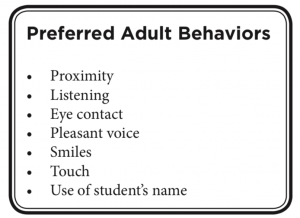In spite of the evidence that contingent attention can change the climate and learning conditions of the classroom, many teachers fail to take full advantage of this powerful tool.
Teachers respond far more frequently to inappropriate social behavior than to appropriate behavior (Beaman & Wheldall, 2000). The result of teachers giving more attention to misbehavior is that their attention may be unknowingly maintaining or increasing the misbehavior.
Adult behaviors that build relationship include:
 communicating privately, in close proximity with the student,
communicating privately, in close proximity with the student,- listening,
- eye contact,
- pleasant voice tone,
- smiles,
- appropriate professional touch, and
- use of students’ names. These behaviors express warmth, care and concern for students while also communicating respect. They increase student affect (the likelihood that they will say they like school or their teacher), compliance (the likelihood that they will do as asked) and also enhance learning.
Not only do these adult behaviors impact relationships, but they also set the stage for effectively interacting with students and delivering genuine feedback. Wong & Wong (2005) describes these teachers as “intentionally inviting.” Their professional attitude depicts their view of students as able, valuable, and responsible.

